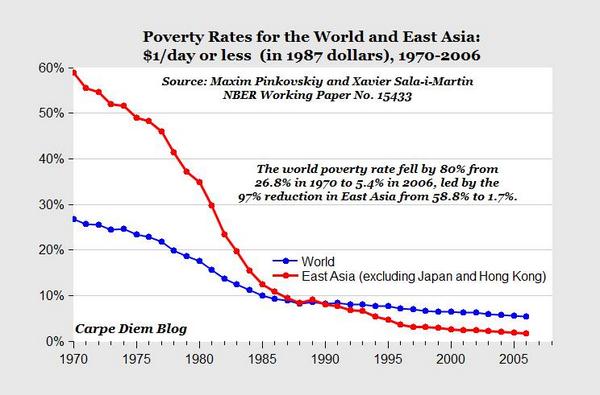At the risk of stereotyping, the Chinese people are remarkably productive when given the chance. Hong Kong and Singapore are dominated by ethnic Chinese, and those jurisdictions routinely rank among the world’s top economies.
 Taiwan is another high-performing economy with an ethnic Chinese population.
Taiwan is another high-performing economy with an ethnic Chinese population.
Ironically, the only place where Chinese people don’t enjoy high average incomes is China. And that’s because there’s too much statism. If you peruse the indispensable Economic Freedom of the World from Canada’s Fraser Institute, you’ll see that China is ranked #115 out of 152 jurisdictions, which is even below nations such as Greece, Haiti, and Vietnam.
As I explain in this interview, China’s politicians are undermining prosperity with a system based on cronyism rather than capitalism.
China’s in the news, of course, because of recent instability in its financial markets. And I’ve taken advantage of the opportunity to give my two cents on this issue (see here and here).
But I was making the same criticisms even when China’s economy was perceived as a big success. I wrote in 2010 that America didn’t need to fear the supposed Chinese economic tiger. I pointed out in 2011 that China was way behind the United States.
And I was at least somewhat prescient when I warned about a bubble in the Chinese economy in this 2011 debate.
Though plenty of folks on the left actually argued that China’s state-controlled economy was something to mimic. Writing for Reason, Ronald Bailey cites some of their silly statements.
As the world watches China’s Communist Party leaders try to order markets around, my mind turned to those pundits who earnestly recommended that the United States emulate the brilliant beneficient Chinese planners in running our economy. The most fulsome China booster was New York Times columnist Tom Friedman. …So enamored of China’s industrial policy was Friedman that in 2010 he likened Chinese economic planning boldness to making “moon-shots.” …And then there is the inevitable Robert Reich. Reich, who is a former Clinton Secretary of Labor, has never been right about anything when it comes to economic policy prescriptions. For example, Reich was convinced in the 1980s the Japan would bury the United States due to the planning acumen of that country’s savvy bureaucrats. …Just shy of 30 years later Reich sang the same stale tune in 2011, only instead of Japanese planners, he was praising the wonders of Chinese industrial planning… As late as 2012, Richard D’Aveni, a Professor of Strategy at Tuck School of Business at Dartmouth College, declared in The Atlantic that “The U.S. Must Learn From China’s State Capitalism to Beat It.”
Actually, Professor D’Aveni is right for the wrong reason. We can learn a lot from statist economies. But we should learn what to avoid, not what to copy.
To conclude, this post shouldn’t be perceived as being anti-China. I want there to be more prosperity in that country, which is why I defended China from an absurd attack by the IMF.
 Moreover, I commend China for reforms that move policy in the right direction. And as I pointed out in the interview embedded above, China’s reforms in the 1980s and 1990s may have been limited, but they did help lift hundreds of millions of people out of abject poverty.
Moreover, I commend China for reforms that move policy in the right direction. And as I pointed out in the interview embedded above, China’s reforms in the 1980s and 1990s may have been limited, but they did help lift hundreds of millions of people out of abject poverty.
Since I mentioned the interview, one of the quirky parts of the discussion was whether politicians should be held criminally responsible for economic mismanagement. Here’s what I wrote a few years ago about an example of that happening in Iceland.
P.S. You probably didn’t realize that it was possible to see dark humor in communist oppression.
P.P.S. But at least some communists in China seem to understand that the welfare state is a very bad idea.
P.P.P.S. Some business leaders say China is now more business-friendly than the United States. That’s probably not good news for America, but my goal is to have a market-friendly nation, not a business-friendly nation.